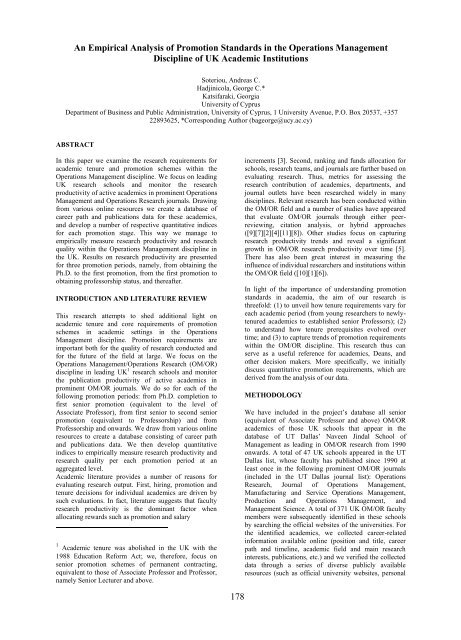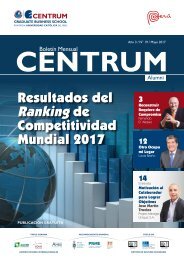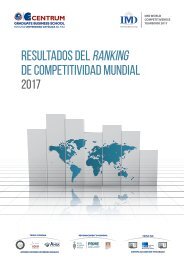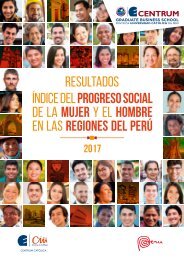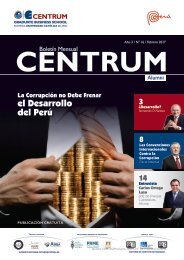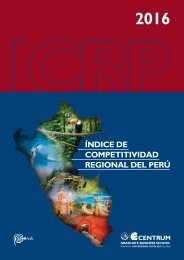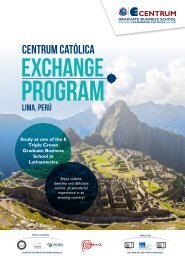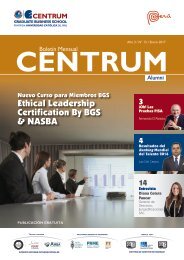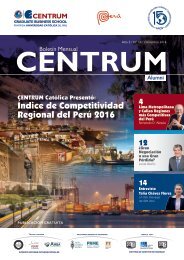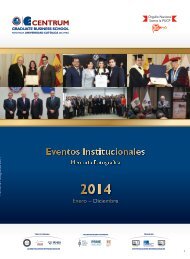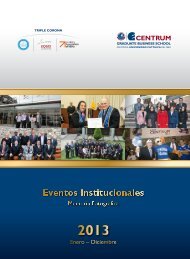Pan-Pacific Conference XXXIV. Designing New Business Models in Developing Economies
This publication represents the Proceedings of the 34th Annual Pan-Pacific Conference being held in Lima, Peru May 29-31, 2017. The Pan-Pacific Conference has served as an important forum for the exchange of ideas and information for promoting understanding and cooperation among the peoples of the world since 1984. Last year, we had a memorable conference in Miri, Malaysia, in cooperation with Curtin University Sarawak, under the theme of “Building a Smart Society through Innovation and Co-creation.” Professor Pauline Ho served as Chair of the Local Organizing Committee, with strong leadership support of Pro Vice-Chancellor Professor Jim Mienczakowski and Dean Jonathan Winterton.
This publication represents the Proceedings of the 34th Annual Pan-Pacific Conference being held in Lima, Peru May 29-31, 2017. The Pan-Pacific Conference has served as an important forum for the exchange of ideas and information for promoting understanding and cooperation among the peoples of the world since 1984. Last year, we had a memorable conference in Miri, Malaysia, in cooperation with Curtin University Sarawak, under the theme of “Building a Smart Society through Innovation and Co-creation.” Professor Pauline Ho served as Chair of the Local Organizing Committee, with strong leadership support of Pro Vice-Chancellor Professor Jim Mienczakowski and Dean Jonathan Winterton.
Create successful ePaper yourself
Turn your PDF publications into a flip-book with our unique Google optimized e-Paper software.
An Empirical Analysis of Promotion Standards <strong>in</strong> the Operations Management<br />
Discipl<strong>in</strong>e of UK Academic Institutions<br />
Soteriou, Andreas C.<br />
Hadj<strong>in</strong>icola, George C.*<br />
Katsifaraki, Georgia<br />
University of Cyprus<br />
Department of <strong>Bus<strong>in</strong>ess</strong> and Public Adm<strong>in</strong>istration, University of Cyprus, 1 University Avenue, P.O. Box 20537, +357<br />
22893625, *Correspond<strong>in</strong>g Author (bageorge@ucy.ac.cy)<br />
ABSTRACT<br />
In this paper we exam<strong>in</strong>e the research requirements for<br />
academic tenure and promotion schemes with<strong>in</strong> the<br />
Operations Management discipl<strong>in</strong>e. We focus on lead<strong>in</strong>g<br />
UK research schools and monitor the research<br />
productivity of active academics <strong>in</strong> prom<strong>in</strong>ent Operations<br />
Management and Operations Research journals. Draw<strong>in</strong>g<br />
from various onl<strong>in</strong>e resources we create a database of<br />
career path and publications data for these academics,<br />
and develop a number of respective quantitative <strong>in</strong>dices<br />
for each promotion stage. This way we manage to<br />
empirically measure research productivity and research<br />
quality with<strong>in</strong> the Operations Management discipl<strong>in</strong>e <strong>in</strong><br />
the UK. Results on research productivity are presented<br />
for three promotion periods, namely, from obta<strong>in</strong><strong>in</strong>g the<br />
Ph.D. to the first promotion, from the first promotion to<br />
obta<strong>in</strong><strong>in</strong>g professorship status, and thereafter.<br />
INTRODUCTION AND LITERATURE REVIEW<br />
This research attempts to shed additional light on<br />
academic tenure and core requirements of promotion<br />
schemes <strong>in</strong> academic sett<strong>in</strong>gs <strong>in</strong> the Operations<br />
Management discipl<strong>in</strong>e. Promotion requirements are<br />
important both for the quality of research conducted and<br />
for the future of the field at large. We focus on the<br />
Operations Management/Operations Research (OM/OR)<br />
discipl<strong>in</strong>e <strong>in</strong> lead<strong>in</strong>g UK 1 research schools and monitor<br />
the publication productivity of active academics <strong>in</strong><br />
prom<strong>in</strong>ent OM/OR journals. We do so for each of the<br />
follow<strong>in</strong>g promotion periods: from Ph.D. completion to<br />
first senior promotion (equivalent to the level of<br />
Associate Professor), from first senior to second senior<br />
promotion (equivalent to Professorship) and from<br />
Professorship and onwards. We draw from various onl<strong>in</strong>e<br />
resources to create a database consist<strong>in</strong>g of career path<br />
and publications data. We then develop quantitative<br />
<strong>in</strong>dices to empirically measure research productivity and<br />
research quality per each promotion period at an<br />
aggregated level.<br />
Academic literature provides a number of reasons for<br />
evaluat<strong>in</strong>g research output. First, hir<strong>in</strong>g, promotion and<br />
tenure decisions for <strong>in</strong>dividual academics are driven by<br />
such evaluations. In fact, literature suggests that faculty<br />
research productivity is the dom<strong>in</strong>ant factor when<br />
allocat<strong>in</strong>g rewards such as promotion and salary<br />
1 Academic tenure was abolished <strong>in</strong> the UK with the<br />
1988 Education Reform Act; we, therefore, focus on<br />
senior promotion schemes of permanent contract<strong>in</strong>g,<br />
equivalent to those of Associate Professor and Professor,<br />
namely Senior Lecturer and above.<br />
<strong>in</strong>crements [3]. Second, rank<strong>in</strong>g and funds allocation for<br />
schools, research teams, and journals are further based on<br />
evaluat<strong>in</strong>g research. Thus, metrics for assess<strong>in</strong>g the<br />
research contribution of academics, departments, and<br />
journal outlets have been researched widely <strong>in</strong> many<br />
discipl<strong>in</strong>es. Relevant research has been conducted with<strong>in</strong><br />
the OM/OR field and a number of studies have appeared<br />
that evaluate OM/OR journals through either peerreview<strong>in</strong>g,<br />
citation analysis, or hybrid approaches<br />
([9][7][2][4][11][8]). Other studies focus on captur<strong>in</strong>g<br />
research productivity trends and reveal a significant<br />
growth <strong>in</strong> OM/OR research productivity over time [5].<br />
There has also been great <strong>in</strong>terest <strong>in</strong> measur<strong>in</strong>g the<br />
<strong>in</strong>fluence of <strong>in</strong>dividual researchers and <strong>in</strong>stitutions with<strong>in</strong><br />
the OM/OR field ([10][1][6]).<br />
In light of the importance of understand<strong>in</strong>g promotion<br />
standards <strong>in</strong> academia, the aim of our research is<br />
threefold: (1) to unveil how tenure requirements vary for<br />
each academic period (from young researchers to newlytenured<br />
academics to established senior Professors); (2)<br />
to understand how tenure prerequisites evolved over<br />
time; and (3) to capture trends of promotion requirements<br />
with<strong>in</strong> the OM/OR discipl<strong>in</strong>e. This research thus can<br />
serve as a useful reference for academics, Deans, and<br />
other decision makers. More specifically, we <strong>in</strong>itially<br />
discuss quantitative promotion requirements, which are<br />
derived from the analysis of our data.<br />
METHODOLOGY<br />
We have <strong>in</strong>cluded <strong>in</strong> the project’s database all senior<br />
(equivalent of Associate Professor and above) OM/OR<br />
academics of those UK schools that appear <strong>in</strong> the<br />
database of UT Dallas’ Naveen J<strong>in</strong>dal School of<br />
Management as lead<strong>in</strong>g <strong>in</strong> OM/OR research from 1990<br />
onwards. A total of 47 UK schools appeared <strong>in</strong> the UT<br />
Dallas list, whose faculty has published s<strong>in</strong>ce 1990 at<br />
least once <strong>in</strong> the follow<strong>in</strong>g prom<strong>in</strong>ent OM/OR journals<br />
(<strong>in</strong>cluded <strong>in</strong> the UT Dallas journal list): Operations<br />
Research, Journal of Operations Management,<br />
Manufactur<strong>in</strong>g and Service Operations Management,<br />
Production and Operations Management, and<br />
Management Science. A total of 371 UK OM/OR faculty<br />
members were subsequently identified <strong>in</strong> these schools<br />
by search<strong>in</strong>g the official websites of the universities. For<br />
the identified academics, we collected career-related<br />
<strong>in</strong>formation available onl<strong>in</strong>e (position and title, career<br />
path and timel<strong>in</strong>e, academic field and ma<strong>in</strong> research<br />
<strong>in</strong>terests, publications, etc.) and we verified the collected<br />
data through a series of diverse publicly available<br />
resources (such as official university websites, personal<br />
178


